- Clone
- 561 (See other available formats)
- Regulatory Status
- RUO
- Other Names
- Gp105-120, My10, Mucosialin
- Isotype
- Mouse IgG2a, κ
- Ave. Rating
- Submit a Review
- Product Citations
- publications

-

Human peripheral blood mononuclear cells were stained with CD14 PE, CD45 PerCP/Cyanine5.5, and CD34 (clone 561) Brilliant Violet 421™ (left) or mouse IgG2a Brilliant Violet 421™ isotype control (right). Dot plots are from gated on CD14-negative cell population.
| Cat # | Size | Price | Quantity Check Availability | Save | ||
|---|---|---|---|---|---|---|
| 343609 | 25 tests | 164€ | ||||
| 343610 | 100 tests | 322€ | ||||
CD34, also known as gp105-120, is a type I monomeric sialomucin-like glyco-phosphoprotein with an approximate molecular weight of 105-120 kD. It is selectively expressed on the majority of hematopoietic stem/progenitor cells, bone marrow stromal cells, capillary endothelial cells, embryonic fibroblasts, and some nervous tissue. CD34 is a commonly used marker for identifying human hematopoietic stem/progenitor cells. Based on different sensitivities, four groups of epitopes of CD34 have been described. CD34 mediates cell adhesion and lymphocytes homing through binding to L-selectin and E-selectin ligands.
Product DetailsProduct Details
- Verified Reactivity
- Human
- Reported Reactivity
- Cynomolgus, Rhesus
- Antibody Type
- Monoclonal
- Host Species
- Mouse
- Formulation
- Phosphate-buffered solution, pH 7.2, containing 0.09% sodium azide and BSA (origin USA).
- Preparation
- The antibody was purified by affinity chromatography and conjugated with Brilliant Violet 421™ under optimal conditions.
- Concentration
- Lot-specific (to obtain lot-specific concentration and expiration, please enter the lot number in our Certificate of Analysis online tool.)
- Storage & Handling
- The antibody solution should be stored undiluted between 2°C and 8°C, and protected from prolonged exposure to light. Do not freeze.
- Application
-
FC - Quality tested
- Recommended Usage
-
Each lot of this antibody is quality control tested by immunofluorescent staining with flow cytometric analysis. For flow cytometric staining, the suggested use of this reagent is 5 µl per million cells in 100 µl staining volume or 5 µl per 100 µl of whole blood.
Brilliant Violet 421™ excites at 405 nm and emits at 421 nm. The standard bandpass filter 450/50 nm is recommended for detection. Brilliant Violet 421™ is a trademark of Sirigen Group Ltd.
Learn more about Brilliant Violet™.
This product is subject to proprietary rights of Sirigen Inc. and is made and sold under license from Sirigen Inc. The purchase of this product conveys to the buyer a non-transferable right to use the purchased product for research purposes only. This product may not be resold or incorporated in any manner into another product for resale. Any use for therapeutics or diagnostics is strictly prohibited. This product is covered by U.S. Patent(s), pending patent applications and foreign equivalents. - Excitation Laser
-
Violet Laser (405 nm)
- Application Notes
-
The 561 antibody recognizes a class III group epitope, which is resistant to sialidase/glycolyprotease and chymopapain treatment.
-
Application References
(PubMed link indicates BioLegend citation) -
- Croockewit AJ, et al. 1998. Scand. J. Immunol. 47:82.
- Rosenzweig M, et al. 2001. J. Med. Primatol. 30:36.
- Product Citations
-
- RRID
-
AB_11147951 (BioLegend Cat. No. 343609)
AB_2561358 (BioLegend Cat. No. 343610)
Antigen Details
- Structure
- 105-120 kD single chain mucin-like glycoprotein
- Distribution
-
Hematopoietic stem/progenitor cells, bone marrow stromal cells, endothelial cells, embryonic fibroblasts
- Function
- Cell adhesion
- Ligand/Receptor
- L-selecin, E-selectin
- Cell Type
- Endothelial cells, Fibroblasts, Hematopoietic stem and progenitors
- Biology Area
- Cell Biology, Immunology, Neuroinflammation, Neuroscience, Stem Cells
- Molecular Family
- CD Molecules
- Gene ID
- 947 View all products for this Gene ID
- Specificity (DOES NOT SHOW ON TDS):
- CD34
- Specificity Alt (DOES NOT SHOW ON TDS):
- CD34
- App Abbreviation (DOES NOT SHOW ON TDS):
- FC
- Hidden Names (DOES NOT SHOW ON TDS):
- Endothelial Cell, Hematopoietic Stem Cell
- UniProt
- View information about CD34 on UniProt.org
Related FAQs
- What is the F/P ratio range of our BV421™ format antibody reagents?
-
It is lot-specific. On average it ranges between 2-4.
Other Formats
View All CD34 Reagents Request Custom Conjugation| Description | Clone | Applications |
|---|---|---|
| Purified anti-human CD34 | 561 | FC |
| FITC anti-human CD34 | 561 | FC |
| PE anti-human CD34 | 561 | FC |
| APC anti-human CD34 | 561 | FC |
| Brilliant Violet 421™ anti-human CD34 | 561 | FC |
| PerCP/Cyanine5.5 anti-human CD34 | 561 | FC |
| APC/Cyanine7 anti-human CD34 | 561 | FC |
| PE/Cyanine7 anti-human CD34 | 561 | FC |
| Alexa Fluor® 647 anti-human CD34 | 561 | FC |
| Brilliant Violet 650™ anti-human CD34 | 561 | FC |
| Brilliant Violet 785™ anti-human CD34 | 561 | FC |
| Alexa Fluor® 488 anti-human CD34 | 561 | FC |
| Alexa Fluor® 700 anti-human CD34 | 561 | FC |
| Brilliant Violet 510™ anti-human CD34 | 561 | FC |
| Brilliant Violet 605™ anti-human CD34 | 561 | FC |
Customers Also Purchased
Compare Data Across All Formats
This data display is provided for general comparisons between formats.
Your actual data may vary due to variations in samples, target cells, instruments and their settings, staining conditions, and other factors.
If you need assistance with selecting the best format contact our expert technical support team.
-
Purified anti-human CD34
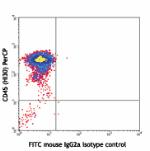
Human peripheral blood mononuclear cells stained with 561 FI... 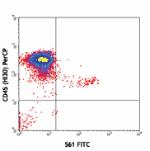
-
FITC anti-human CD34

Human peripheral blood mononuclear cells were stained with C... -
PE anti-human CD34
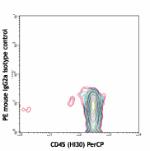
Human peripheral blood mononuclear cells stained with 561 PE... 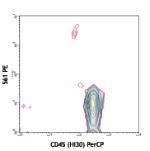
-
APC anti-human CD34
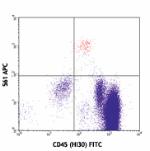
Human peripheral blood leukocytes stained with CD45 (HI30) F... 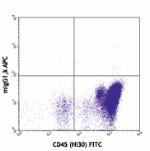
-
Brilliant Violet 421™ anti-human CD34

Human peripheral blood mononuclear cells were stained with C... -
PerCP/Cyanine5.5 anti-human CD34

Human peripheral blood mononuclear cells were stained with C... -
APC/Cyanine7 anti-human CD34

Human peripheral blood mononuclear cells were stained with C... -
PE/Cyanine7 anti-human CD34

Human peripheral blood mononuclear cells were stained with C... -
Alexa Fluor® 647 anti-human CD34
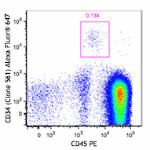
Human peripheral blood mononuclear cells were stained with C... 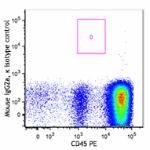
-
Brilliant Violet 650™ anti-human CD34
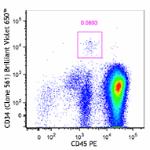
Human peripheral blood mononuclear cells stained with CD45 P... 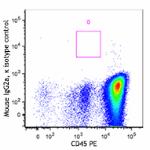
-
Brilliant Violet 785™ anti-human CD34
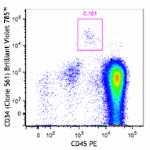
Human peripheral blood mononuclear cells stained with CD45 P... 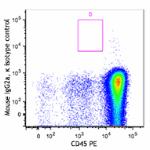
-
Alexa Fluor® 488 anti-human CD34
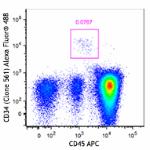
Human peripheral blood mononuclear cells stained with CD45 A... 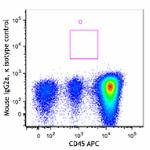
-
Alexa Fluor® 700 anti-human CD34
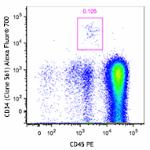
Human peripheral blood mononuclear cells were stained with C... 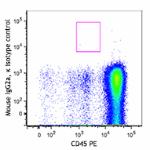
-
Brilliant Violet 510™ anti-human CD34

Human peripheral blood mononuclear cells were stained with a... -
Brilliant Violet 605™ anti-human CD34

Human peripheral blood mononuclear cells were stained with a...
 Login / Register
Login / Register 











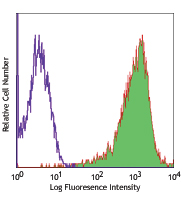


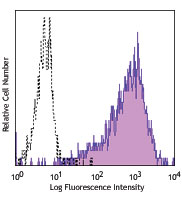



Follow Us